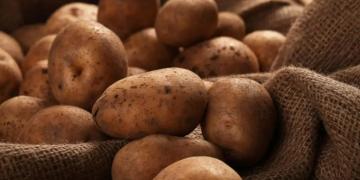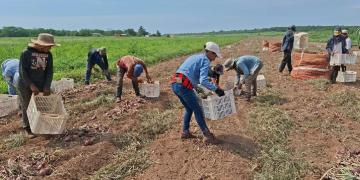EEUU: A french fry boomtown emerges as a climate winner , as long as it has water
Climate change has helped a small town become the world capital of french-fry production. But a dwindling water supply could reverse its progress entirely.

OTHELLO, Wash. — From miles away, you can smell this 8,700-person hamlet on the high plains of central Washington. To locals, it smells like home. To anyone else, it’s the smell of french fries.
Othello produces more frozen french fries, hash browns and tater tots than anywhere else in the world — 1.5 billion pounds a year, or 15 percent of North American production. Every 10 minutes for roughly 10 hours a day, a truck carries more than 60,000 pounds of potatoes into town.
Over the next two decades, Othello is positioned to produce even more. The town is abundant with renewable energy and sufficiently far north for its surrounding potato farms to flourish as the Earth grows hotter. Potato processors are betting hundreds of millions of dollars that Othello will be a haven from climate change.
“Yes, we’re a boomtown,” said Othello Mayor Shawn Logan.
But rapid investment has brought rapid growth, and now — like many places across the American West — Othello is running out of water. Unless local officials can come up with $400 million to pipe water from Columbia River canals to the north, the region’s wells could run dry in as few as five years.
Population growth and climate change pose significant challenges for water management across the country. Only 2.5 percent of the planet’s water is freshwater, much of which resides in underground aquifers — half of which will be depleted in the next 40 years, according to Colorado State University research.
In Othello, the water shortage threatens “the livelihoods of farmers and the continued existence of multiple communities in eastern and central Washington,” said Sara Higgins, executive director of the Columbia Basin Development League, the group tasked with funding the expansion.
“But this isn’t just about them,” Higgins said. “This is about an entire country’s food security.”
An agricultural mecca’
Othello has emerged as a rare winner of climate change as the world endures what may be the hottest year in recorded history. Though central Washington is essentially a desert, the government-funded Columbia Basin Project transformed the region into a world-class food basket in the 1950s by damming the Snake and Columbia rivers and constructing a network of groundwater wells.
Cherry and apple orchards and fields of potatoes soon sprouted in place of sagebrush, forming the region’s economic backbone. Then Mount St. Helens erupted in 1980, blanketing the area with 6 inches of volcanic ash.
The ash formed a chemically supercharged soil that transformed local farming economies into global ones. Now, the area can grow twice as many tubers per acre as the famed potato fields of Idaho, said Dale Lathim, executive director of the Potato Growers of Washington.
“It’s an agricultural mecca,” Lathim said. “We’re not the best farmers in the world. But we are the most blessed.”
More recently, Othello has emerged as a mecca of climate resilience. Last year, droughts sent California’s total potato production tumbling 30 percent. Meanwhile, the Midwest shifted some potato growing seasons amid hotter, drier weather that prevents the temperature from dropping into the ideal range at night, leading to an overall decline in quality.
“You need nights that are reasonably cool to grow potatoes,” said Nicholas Bond, a climatologist at the University of Washington. “That’s why commercial fields are in the northern states of the U.S.”
Columbia Basin potato farmers have been able to overcome lower yields even during the hottest summers by producing high-quality crops. In January, McDonald’s said hash browns from potato giant J.R. Simplot’s Othello plant scored highest among the fast-food chain’s global producers. A framed photo commemorating the honor hangs in the lobby of the factory’s office, signed by each of its managers.
High-quality potatoes also take less energy to process, said Steve Marek, plant manager for McCain Foods, Othello’s largest potato processor. McCain’s Othello factory is also its most water-efficient.
Processors are investing accordingly. Last year, McCain unveiled a $300 million expansion in Othello, the first of several planned upgrades, Marek said.
But doubts have been raised about the town’s long-term viability. Five years ago, Simplot considered a move to the nearby town of Moses Lake over concerns about the company’s water supply, but ultimately decided against the move when Logan secured grants for a new reservoir.
Watching the water
On a recent August morning, about two dozen local officials gathered in Republican state Rep. Tom Dent’s airplane hangar about 15 miles from Othello for their monthly strategy session about the looming crisis.
Irrigation experts say the region’s wells are on track to run dry by 2028. It’s the “one thing we really talk about at this meeting,” said Jon Erickson, development coordinator for the East Columbia Basin Irrigation District.
The wells were never meant to be a long-term water source. They were supposed to be a temporary solution until the rest of the Columbia Basin Project was completed, said local irrigation consultant Dan Haller, adding that the rise of environmental regulations during the 1970s stalled development.
“Environmental review became challenging. Federal budgets changed; priorities changed,” Haller said. “So the project did not get built out.”
Fifty years later, the wells are depleted, creating what the Columbia Basin Development League calls “a looming economic and environmental catastrophe.”
State officials have plans for pumps and pipelines to connect the Columbia Basin Project to canals carrying water from the Columbia River to the north. Unlike the Colorado River, which serves 40 million people across seven states, the Columbia is not yet oversubscribed: Only 3 percent of its water flow is currently being tapped.
“There’s not a water shortage — there’s a lack of infrastructure,” Higgins said. “The water is right there.”
But work on the project has been slow. So far, the working group has secured more than $125 million from a combination of federal and state grants. But an estimated $400 million is needed to finish the job; the development league is looking to federal, state and local governments for help, with grants from the Agriculture Department as its next target, said Kristina Ribellia, director of the Columbia Basin Conservation District.
If the project is completed, Othello would have water for 70 years. If not, the potatoes — and the potato industry — could disappear. The consequences would be widespread; Washington is the second-largest grower of fruits and vegetables by dollar value, behind only California.
French-fry fortresses
At McCain’s Othello plant, quality assurance manager Shane Gehin’s job includes checking the hash browns. So on a recent July afternoon, he bit into a steaming patty of shredded spuds.
He moved them around in his mouth, closed his eyes and, for just a moment, chewed.
“Yep,” he said, writing a quick note. “That’s a perfect hash brown.”
The plant manager compares it to a food critic’s task.
“It’s a sensory experience,” Marek said. “Like tasting wine.”
Share this article
Share
Gehin’s tasting laboratory is among many additions to the new plant, a sprawling facility that houses multiple potato-focused microclimates. On hot days, employees in non-air-conditioned areas sport T-shirts soaked by steam from water that drips off potatoes. Workers in packing areas, kept at 35 degrees Fahrenheit, wear jackets as they transport bags of frozen product. The machinery is so loud that most workers communicate through headsets.
Between McCain and its Idaho-based rival, J.R. Simplot, more than 700 Othello residents work in potato processing, 13 percent of the adult population.
McCain and Simplot have helped turn potato processing into one of the state’s largest industries. Last year, frozen french fries became Washington’s second-most valuable agricultural export after seafood, a 16 percent increase from 2021.
Industry officials expect potato demand to grow with the world’s population. By 2050, McCain says, it will need to increase production by 70 percent. Using current technology, that would require 67 percent more farmland — and 65 percent more water.
Both McCain and Simplot are members of the Columbia Basin Development League, and Higgins said the processors are “engaged and involved” in plans to expand the region’s water supply.
“None of us are immune from the impacts of climate change,” McCain said in a statement, adding that “the processing facility in the Columbia Basin [is] a key part of this journey.”
Logan thinks Othello could pivot in the worst-case scenario: that the water shortage goes unsolved. “I think we could diversify into tomato processing, into more cold storage, potentially,” the mayor said. “But potato manufacturers leaving Othello would be devastating.”
The potential losses would be more than economic. Potatoes are part of the town’s culture.
“I’ll be at a restaurant, and my wife will ask me what I’m doing. I’m grading the fries,” said Leo Garza, a quality manager for Simplot.
Zeke Rodriguez, plant manager of Othello’s Simplot factory, worked his way from the factory floor to a corner office over 35 years with the company, which paid for his college degree. Above his desk is a photo not of his family, but of the company’s founder, J.R. Simplot.
“I owe it to him,” Rodriguez said, pointing to the photo. “Everything I’ve built here with my life, I’ve built through Simplot.”
Fuente: https://www.washingtonpost.com/business/2023/08/21/potatoes-farming-climate-water/




